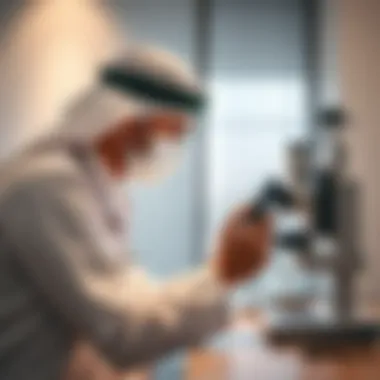The Visa Medical Test in Dubai: Essential Insights


Intro
Navigating the complexities of expatriate life in Dubai brings with it a set of unique challenges and requirements. One of the most crucial aspects of securing a visa in this bustling metropolis is the visa medical test. This examination is not merely a formality; it's an essential step that can significantly influence an expat's residency status and overall experience in the city. Understanding the ins and outs of this process is paramount for anyone considering a move to Dubai.
The visa medical test serves as a means for the local health authorities to ensure that individuals entering the country do not pose a public health risk. From infectious diseases to general health assessments, this test covers a broad spectrum of health concerns. But it’s not just about health checks—there are also legal implications and compliance requirements that one must adhere to. Failing to complete the medical test adequately or within the stipulated time frame can result in visa denial, which is a situation that no prospective expat wants to face.
In this article, we aim to break down the various elements related to the visa medical test in Dubai, from procedures and necessary documentation to insights on how to efficiently navigate the healthcare landscape. The objective is to empower future residents with the knowledge they need, making the transition smoother and less daunting.
Whether you're a first-time expatriate or someone looking to renew your residency, understanding this process is critical. So, let’s dive into the depths of the visa medical test and ensure you’re well-equipped to meet this requirement head-on.
Preamble to Visa Medical Testing
Navigating the journey of expatriation to Dubai often involves several critical steps, with the visa medical test standing as a significant milestone. This test is not merely a bureaucratic hurdle but a vital component for ensuring both individual and public health within the UAE. Understanding its nuances can greatly alleviate the anxiety associated with moving to a new country.
Purpose of the Visa Medical Test
The primary objective of the visa medical test is to ascertain the physical health of expatriates seeking residency in Dubai. This requirement helps prevent the entry of infectious diseases into the community and ensures that those moving to the UAE are fit to reside there.
Apart from health safety, this test also serves a dual purpose: it evaluates various health conditions that might impede an individual’s ability to work and live harmoniously within Dubai. For instance, chronic illnesses that require extensive treatment could pose challenges in a foreign environment.
It’s worthwhile to mention that the test often reflects the UAE’s commitment to maintaining a healthy population, benefiting not just expatriates but also the local community—"A stitch in time saves nine."
Overview of UAE Immigration Policies
The immigration policies in the UAE, especially regarding health and residency, are designed to uphold both individual health and public welfare. In a country that attracts a diverse array of expatriates from various cultural backgrounds, these policies are essential for fostering a harmonious living environment.
Healthcare regulations are strict, and they form a backbone for the UAE's approach to immigration, ensuring that every individual coming into the nation abides by health standards. The visa medical test is integral in this respect, reinforcing the necessity for compliance with local laws to achieve successful residency.
As policies can evolve, keeping abreast with the latest rules and regulations is crucial. Regular updates from the Ministry of Health and Prevention, or visiting official webpages like Gov.ae can provide real-time information and guidelines.
Having an understanding of these policies not only prepares expatriates for the medical test but also fosters a smoother transition into the dynamic landscape of Dubai. This foresight helps expatriates make informed decisions, ultimately simplifying the integration process into this vibrant city.
Eligibility for the Visa Medical Test
When it comes to moving overseas, particularly to a bustling metropolis like Dubai, understanding the eligibility for the visa medical test is crucial. This step is not merely a formality; it plays a significant role in ensuring that expatriates can contribute positively to the local community. Getting this aspect right can mean the difference between a smooth transition into life in the UAE or facing unnecessary delays.
Who Needs a Medical Test?
In Dubai, various groups of expatriates must undertake a medical test, and the criteria are set by local regulations. Essentially, if you are applying for a residence visa, work visa, or even some long-term visit visas, a medical evaluation becomes mandatory. This requirement extends to:
- Foreign workers: Those coming to take up employment, regardless of the sector.
- Family members: Dependents of expatriates, particularly spouses and children, are also required to undergo a medical assessment.
- Investors and business owners: Even entrepreneurs seeking to establish a business in Dubai must comply with this requirement.
These tests primarily aim to reduce the risks related to communicable diseases and to ensure that all residents maintain a standard of health acceptable by UAE law. Skipping this important step can lead to visa rejection, underscoring the necessity of understanding who falls under this requirement.
Types of Visa Categories
The visa categories that necessitate a medical test can be grouped into several types, each with slightly different procedures:
- Employment Visas: These are for individuals coming to Dubai to work. Employers often arrange for their employees to undergo these tests as part of the hiring process.
- Investor Visas: Those who are planning to invest substantial sums in the Emirates usually partake in medical testing as well. This ensures that they are fit for residency & business engagement.
- Family Visas: Expatriates sponsoring family members must ensure that their dependents meet health standards too, as part of the process for obtaining the appropriate residency visas.
Understanding which visa category applies to you is pivotal, not just for compliance but also for properly preparing for the medical tests involved. Ultimately, this knowledge can save time and help maintain your momentum toward settling into your new life in Dubai.
The Medical Testing Procedure
The medical testing procedure stands as a fundamental aspect of the visa application process in Dubai. This test is not merely a bureaucratic hurdle but a critical measure put in place to safeguard public health and help ensure that all new residents are fit for living in a vibrant, yet densely populated city. For expatriates, understanding the nuances of this procedure can make the difference between a smooth transition to life in Dubai and a series of unexpected delays.
A thorough grasp of the medical testing procedure is essential; it involves several steps that necessity compliance with local health regulations. The importance here cannot be overstated: failing to meet these medical requirements may lead to visa rejections or complications, leaving expatriates in a precarious position regarding their residency status.
Additionally, these tests are a reflection of broader public health concerns. With the government prioritizing the health and safety of its inhabitants, being aware of what is involved in this process becomes a priority for anyone seeking to live and work in Dubai.
Steps Involved in the Test
The actual procedure for the medical test is systematic and designed to be straightforward. Here's an overview of what expatriates typically can expect:
- Schedule an Appointment: Before heading to the medical center, you’ll need to secure a time slot. This can typically be done through the clinic’s website or via phone.
- Required Documentation: On your appointment day, it’s important to bring along the necessary documents. This usually includes your passport, visa application, and a recent photograph.
- Initial Consultation: Upon arrival, you will have a brief meeting with a healthcare professional who’ll explain the tests involved and derive a medical history from you.
- Conducting Tests: The tests often include blood tests, chest X-rays, and screening for infectious diseases. Depending on individual health backgrounds, additional tests may also be advised.
- Waiting for Results: After the tests, results will typically take a few days to process, although some clinics can provide quicker results depending on their facilities.
- Submitting Results: Once the results are in, these need to be submitted to the relevant immigration authority along with your visa application.
By being well-prepared at each step of the procedure, expatriates can minimize delays and set the stage for a successful relocation.
Understanding Test Results
Navigating through the results of your visa medical test can be an anxious affair, but it's crucial to grasp their implications thoroughly. Results are usually categorized into acceptable or unacceptable categories based on established health standards set by UAE authorities.
- Acceptable Results: If your results come back clean, you’ll receive a certificate which will be vital for your visa application. This means you’ve met the health requirements set forth by the local authorities.
- Unacceptable Results: In instances where health concerns are flagged, such as positive results for communicable diseases, it may jeopardize your ability to obtain a visa. Understanding these aspects allows individuals to take informed next steps, which may include seeking medical treatment or further consultations.
"It’s always better to be aware of potential health issues before applying for the visa; knowledge is power when it comes to navigating immigration hurdles."
Ultimately, awareness and preparedness are key in ensuring a favorable outcome, allowing expatriates to focus on the excitement and opportunities awaiting them in Dubai.
Required Documents for the Medical Test
In navigating the process of the visa medical test in Dubai, having the right documents in hand is not just a formality; it’s a crucial step. Certain documents lay the groundwork for a smooth experience, ensuring you comply with the requirements set forth by local authorities. A missing paper could delay your visa process, which is something no one wishes. Here’s a closer look at what you'll need and the significance of these documents.
List of Necessary Documents
When preparing for your visa medical test, ensure you have the following documents:
- Valid Passport: This is the cornerstone of your identity verification. Authorities need it to confirm your nationality and personal details.
- Visa Application Form: This shows that you’re an applicant and are going through the legal processes needed to secure a visa for Dubai.
- Passport-sized Photographs: Usually, two to three recent pictures are required, so check the dimensions before heading out. Each medical facility has specific size requirements.
- Health Insurance Information: While not mandatory for all cases, providing your health coverage details may facilitate your interactions with the medical facility and aid in any necessary treatments.
- Previous Medical Records (if applicable): Any documents indicating your health history could be of great help, especially if you have existing conditions. This might not be mandatory but can smoothen your check-up process.
It's worth noting that some centers might require additional documents based on individual situations, so it’s wise to inquire before your appointment.
Where to Submit Documents


Submitting the required documents correctly is another vital aspect of the medical test procedure. In Dubai, submissions are typically done at designated medical centers that are approved by the UAE government.
Here’s how to go about it:
- Visit Approved Medical Centers: You can choose from various certified facilities across Dubai. It's smart to double-check their status and reviews before making your choice. Popular centers include Al Zahra Private Hospital and NMC Hospital.
- In-Person Submission: When you arrive, present all required documents at the reception. Ensure that you hand them directly to a staff member to avoid any confusion.
- Online Pre-submission: Some medical facilities offer online portals where you can upload your documents ahead of time. This can save you a great deal of time during your actual visit.
- Track Submission: Keep a small record or snapshot of the documents you submitted. This will help if you need to follow up or in case of any discrepancies later on.
Tip: Always carry photocopies of important documents when you submit them. It helps to have backup copies in case anything goes amiss.
Be punctual with your submissions to ensure that all processes align with your visa timelines, and you can go about your journey in Dubai without unnecessary hassle.
Cost of the Visa Medical Test
Understanding the cost of the visa medical test is crucial for expatriates planning to move to Dubai. It’s not just about budgeting the expense; it’s also about knowing what you are paying for and how this investment impacts your relocation process. Given the stringent immigration policies of the UAE, ensuring compliance with medical examination requirements is a step that should never be overlooked.
Before embarking on any financial commitments, it’s wise to have a comprehensive understanding of the fees associated with the medical test and what these fees entail. This clarity helps in planning your finances better and avoiding unexpected costs that may crop up later.
Breakdown of Fees
The fees associated with the visa medical test can vary depending on the medical center and the tests you are required to undergo. Here’s a closer look at typical costs you might encounter:
- Basic health check (general consultation and physical exam): around AED 250–500.
- Blood tests for infectious diseases (like HIV, Hepatitis B and C, etc.): AED 100–250 per test, depending on the specific test.
- Chest X-ray for tuberculosis screening: approximately AED 200–300.
- Additional tests (for chronic conditions or specific requirements): could range from AED 150–400.
It’s advisable to get a clear estimate from your chosen medical center ahead of time to understand what the total is likely to be, as prices can fluctuate based on demand or changes in policy.
Payment Options Available
When it comes to paying for the medical test, various options are available, making it relatively easier for expatriates to handle this part of their visa application journey:
- Cash payments are widely accepted at most medical centers. Ensure you keep the receipt as you will need it for processing your visa.
- Credit and debit cards are also commonly accepted, providing a more secure transaction.
- Insurance coverage may cover part of the costs if you've purchased health insurance that aligns with UAE regulations. It’s essential to check your policy details beforehand.
In some cases, you might even find medical centers that allow online payments during the booking process, allowing for a smoother experience.
By knowing the costs upfront and understanding your payment options, you can navigate the visa medical test process with confidence, ensuring you're well-prepared for the next steps in your journey to becoming an expatriate in Dubai.
Locations for Medical Tests in Dubai
Navigating the visa medical test process in Dubai necessitates a clear understanding of where these essential assessments can be conducted. The locations for medical tests play a critical role in ensuring that expatriates can complete their visa requirements efficiently and without unnecessary delays. With a variety of approved medical centers scattered throughout the city, the ease of access to these facilities can significantly influence the experience of individuals undergoing this procedure. Furthermore, understanding these locations helps to alleviate some of the uncertainty and anxiety often associated with health assessments in a new country.
Approved Medical Centers
Dubai boasts a range of approved medical centers, each equipped to carry out the necessary tests required for visa processing. These centers are licensed and recognized by the UAE government, providing assurance that they meet established health regulations. Some notable centers include:
- Health Bay Polyclinic: Known for its high standard of care and comprehensive services, this clinic provides thorough medical examinations, including blood tests and chest X-rays, tailored for visa applications.
- Al Zahra Clinic: Located in Al Zahra, this facility is well-regarded for its efficiency and friendly staff, boasting modern equipment to expedite the testing process.
- Dubai Health Authority (DHA) testing centers: With multiple locations, the DHA centers offer various services, adhering strictly to the protocols outlined by local health authorities.
Finding the right center can often be a matter of convenience and preference. Individuals should consider proximity to their residence or workplace, as well as the center's operating hours. Many of these facilities also provide online booking options, which can streamline the process and save time.
Accessibility and Convenience
Accessibility is a key element when it comes to medical tests in Dubai. Given the city's infrastructure, many approved medical centers are strategically located near public transport hubs, making them easy to reach. This feature is particularly beneficial for expatriates who may not own a vehicle or are unfamiliar with the local road system.
In addition, most centers are designed to accommodate various needs:
- Multilingual Staff: Many medical centers in Dubai have personnel fluent in multiple languages, reducing language barriers and helping expats feel more comfortable during their visit.
- Flexible Scheduling: The centers often offer extended hours, including weekends, which can be critical for working professionals who may not have the luxury to take time off during regular business hours.
- Waiting Times: Patients can expect variable waiting periods based on the time of day and the center's scheduling. Many facilities provide an estimated wait time online, which enhances the overall convenience of the visit.
Overall, the choice of location for a medical test is more than a simple decision; it impacts the overall efficiency and experience of fulfilling one’s visa requirements in Dubai. Choosing an accessible, well-rated center can make all the difference, ultimately leading to a smoother transition into the expatriate lifestyle.
Timeframe for Completing the Medical Test
Understanding the timeframe for completing the medical test is essential for expatriates aiming to settle in Dubai. This knowledge can greatly influence planning and alleviating any anxiety related to the visa application process. The timing of the medical examination is often critical, as it ties into the overall visa application timeline.
Typical Duration of the Test
Generally speaking, the medical test itself is not a protracted affair. Most tests can be wrapped up in about a few hours, depending on the number of tests conducted and the efficiency of the medical facility. This speed can be a breath of fresh air in a sometimes drawn-out visa process.
Unlike some complex medical evaluations, the visa medical test in Dubai is straightforward and designed to be efficient. Expatriates typically undergo several key examinations which include blood tests, chest x-rays, and general physical evaluations. These tests are usually standardized across approved medical centers.
It’s worth noting, though, that while the testing process can be completed quickly, the waiting time for results can be a different story.
Receiving Results
The span of time before results are available can vary widely—generally ranging from one to three days. Receiving results efficiently is crucial, especially when the test outcome directly affects the visa application timeline. Some facilities may offer quicker results for a higher fee, so it’s beneficial to inquire about available options.
After completing the tests, expatriates must wait for the medical center to process the findings. If tests show that everything is clear, this information will be forwarded to the immigration authorities. Inversely, if there are concerns over the test results, it may lead to further assessments.
In summary, being well-informed about the timeframe not only aids in managing expectations but also helps expatriates stay on top of their visa applications with minimal delays. Knowing the timeline allows individuals to plan accordingly and reduces frustration during this critical phase of relocating to Dubai.
"Awareness of how long the medical testing process takes can turn what seems like a confusing operation into a clear journey towards your visa approval."
For more detailed regulations, visit the official UAE Government site.
When preparing for a medical test, be sure to keep your documents and required paperwork handy. A little preparation can save you time and hassle. The future will be brighter when you know what to expect!
Common Health Conditions Reviewed
The medical test required for visa processing in Dubai delves into various health conditions that are significant for both the individual and public health at large. Understanding these common health conditions is paramount not only for compliance with local regulations but also to ensure the well-being of a vibrant expatriate community.
In essence, the medical evaluation serves as a preventive measure, aiming to curb the spread of infectious diseases while also addressing chronic health issues that might affect one's ability to integrate effectively into the society.
Tests for Infectious Diseases
One of the primary focuses during the visa medical examination is the screening for infectious diseases. This is fundamentally important in a globally connected world where such diseases can escalate rapidly if left unchecked. Typically, the tests include blood tests for conditions like HIV, hepatitis B, and hepatitis C.


Understanding what these diseases are can aid in demystifying the testing process for many.
- HIV: This virus attacks the immune system and can lead to AIDS if not treated. Testing positive can not only affect one's visa approval but will also necessitate immediate medical interventions.
- Hepatitis B and C: Both are serious liver infections. It is critical that expatriates are tested, as transmission rates can be high in densely populated areas.
Ultimately, knowing one's status is predominant. This creates a safety net not only for the individual but also for those around them. The results help healthcare professionals devise the necessary treatment plans and preventive care strategies.
Screening for Chronic Conditions
Chronic conditions such as diabetes, hypertension, and cardiovascular diseases are other key areas examined during the medical test. These conditions require ongoing management and can significantly impact an expatriate’s quality of life. Beyond just qualifying for a visa, addressing such issues ensures that individuals maintain a healthy lifestyle while contributing to the economic and social fabric of Dubai.
- Diabetes: Especially in expatriate-heavy populations, this can be prevalent. Regular screening helps in adjusting lifestyle factors early, preventing complications down the road.
- Hypertension: Often termed the silent killer, untreated high blood pressure can lead to serious health problems. It's crucial for testing to identify individuals at risk and instigate lifestyle changes as well as potential medication.
- Cardiovascular Diseases: Awareness and early intervention can save lives. Understanding risk factors through testing can direct individuals to the right medical resources.
The implications of these tests stretch far beyond the confines of compliance with immigration policies. They empower expatriates with information about their health status, allowing for informed decisions regarding their wellbeing.
By recognizing these common health conditions and their potential repercussions, individuals can take proactive steps not only for their health but also to foster a safer community in the emirate of Dubai. This collective awareness enhances both personal health and public safety, reinforcing the importance of adhering to the visa medical test requirements.
"Health is wealth, and understanding health conditions is the first step towards ensuring it."
Not just a bureaucratic hurdle, the medical test in Dubai is a vital step towards promoting overall public health and individual well-being.
The Importance of Health Insurance
Health insurance plays a pivotal role in the overall well-being of expatriates living in Dubai. For anyone moving or living abroad, grasping the nuances of health coverage is not just a formality; it's a necessity. The healthcare environment can be drastically different from what one is used to, thus understanding health insurance becomes critical in ensuring not only compliance with local laws but also securing oneself against potential financial burdens.
Choosing the Right Health Coverage
When it comes to selecting health coverage in Dubai, a myriad of options is available. Expatriates must assess their needs carefully.
- Policy Types: Familiarize yourself with the two primary types of health insurance plans—international and local. International plans may offer broader coverage that extends even outside the UAE, while local plans can sometimes provide cost-effective solutions tailored for residents.
- Coverage Limitations: It’s essential to check the fine print regarding exclusions. Some policies might not cover pre-existing conditions or specific medical services, which could leave you vulnerable, especially if you need immediate care.
- Network Hospitals: Assess the hospitals and clinics that are within the insurance company's network. Accessibility to reputable medical facilities can make all the difference during a health crisis.
- Cost vs. Benefits: Weighing the monthly premium against the coverage benefits is critical. A cheaper plan might sound enticing, but it could mean higher out-of-pocket costs in the long run.
Legal Requirements for Expatriates
Understanding the legal landscape governing health insurance in Dubai is paramount for expatriates. The UAE has made health coverage mandatory for all residents, including expatriates, under the 2013 Health Insurance Law. Here are key points to note:
- Mandatory Coverage: All expatriates must hold a valid health insurance policy that complies with local government regulations. Failure to do so can result in penalties which affect one's residency status.
- Employer Responsibilities: Many employers in Dubai provide health insurance as part of employment contracts. However, it’s crucial to understand the scope of this coverage and what to do if it falls short of needs.
- Updates and Changes: Keep an eye on any changes in health insurance regulations, as policies can evolve. The UAE government periodically revises the legal requirements, which can influence available insurance options.
"Being well-informed about health insurance regulations not only fulfills legal obligations but also enhances your overall quality of life in Dubai."
In summary, investing in the right health insurance while adhering to legal stipulations can transform the expatriate experience in Dubai, reducing anxiety and allowing individuals to thrive in their new environment.
Implications of Test Results
The results of the visa medical test hold significant sway over the visa application process for expatriates in Dubai. Understanding the implications of these results is crucial for anyone looking to navigate the somewhat daunting waters of UAE immigration policy. The nature of your medical results can either facilitate a smooth transition into Dubai's bustling environment or introduce obstacles that might delay or even prevent your visa approval. Therefore, it’s essential to approach this aspect with thorough awareness and preparation.
Acceptable and Unacceptable Results
When you undergo the medical assessment, the outcome categorizes your health status as either acceptable or unacceptable in the eyes of the immigration authorities. Acceptable results typically imply that the individual does not present any communicable diseases that could pose a risk to public health, as well as meeting any other health benchmarks set by the UAE's immigration laws.
Conversely, unacceptable results can vary in severity. For instance, a positive test for certain infectious diseases, like tuberculosis or HIV, might lead to immediate issues in your application process. If your results fall under this category, it does not mean the door is completely shut; however, it does necessitate a deeper dive into potential remedies and additional steps you'll need to take. This is where proactive measures become pivotal.
"A clear medical report is often the golden ticket to a hassle-free move, but even an unfavorable result doesn’t spell the end of your journey."
Addressing Health Issues Identified
If faced with unfavorable results, addressing these health concerns swiftly and proactively is essential. Here are some considerations for managing your health status:
- Seek Professional Treatment: If any health issues arise from your test, consulting with a qualified healthcare provider early on is critical. They can prescribe treatment regimes tailored to your situation.
- Follow-Up Tests: In some cases, follow-up tests may be necessary to confirm any initial results or monitor the effectiveness of treatments. Keep communication channels open with your chosen medical professionals to ensure that you are not left in the dark about your health.
- Documentation of Treatment: It's beneficial to gather comprehensive records that detail any medical treatments or interventions undertaken. Providing this documentation can help support your visa application when addressing previous unfavorable results.
Ultimately, the implications of your medical test results stretch beyond the mere approval or denial of your visa. They can impact your entire experience in Dubai and shape your future, especially in terms of access to healthcare services and the need for health insurance.
Having a solid understanding of these implications helps you navigate through what can be a complicated process with clarity and confidence, ensuring you’re well-prepared for any eventuality.
Follow-Up Procedures for Health Concerns
When navigating the landscape of health and medicine related to visa processes, particularly in a multicultural society like Dubai, understanding follow-up procedures for health concerns can prove vital. The importance of such follow-up procedures extends beyond mere compliance; it encapsulates the essence of safeguarding not just personal health but also the wellbeing of the wider community. If someone finds themselves needing to address any health issues post-test, knowing how to act promptly and effectively can make a world of difference.
What to Do If Unfit for Visa
If the medical test yields results that are deemed unfit for visa purposes, it's crucial to tackle the situation head-on. Taking action can feel overwhelming, but keep in mind these steps that can guide one through a challenging moment:
- Understand the Results: Begin by thoroughly reviewing the test results. Sometimes, what might appear alarming could be a misunderstanding or something quite manageable.
- Consult a Specialist: It's advisable to seek out a healthcare professional or a specialist who can provide clarity on the results. They may offer insights not just on the results but also on potential treatment options or remedies.
- Consider Re-evaluation: In a fair number of cases, individuals might need a re-evaluation. This requires scheduling a new appointment, but can help in ensuring that any initial results were accurate.
- Documentation: It's important to keep records of every consultation and treatment regarding health matters. This will not only assist any potential future immigration inquiries but can also help solidify your health plan moving forward.
Engaging with local healthcare services can provide additional insights and treatment pathways. Involving trusted networks within the expatriate community can also help in finding reputable specialists.
Seeking Medical Assistance
Should health issues arise from the visa medical test, knowing where to go and what resources are at hand is paramount:
- Local Clinics and Hospitals: Dubai is teeming with healthcare facilities ranging from government hospitals to private clinics. Many of these establishments have English-speaking staff, making accessibility easier for expatriates.
- Telemedicine Services: In light of recent advancements, using telemedicine can be a viable option. Virtual consultations can save time and allow for quick access to medical advice without the burden of travel.
- Community Health Initiatives: Engage with community health events or workshops that may be organized by local expat groups. These can be excellent opportunities to learn about healthcare options from people who have been in similar situations.
- Health Insurance Guidance: If you have health insurance, it’s worthwhile to consult with your provider about your coverage for conditions identified during your medical tests. Understanding what’s covered can lead to cost-effective health decisions.
Remember: the overall goal is to prioritize health not just for individual stability, but to contribute positively to the community’s wellbeing as well.
For further resources, check out relevant links:
Navigating post-test procedures can be daunting, but creating a clear route through the available healthcare options makes the process smoother and more manageable for expatriates.
Government Regulations and Policies
Understanding the government regulations and policies concerning visa medical tests in Dubai is not merely an academic exercise; it is a necessity for anyone looking to live and work in the emirate. These regulations play a crucial role in the visa application process, ultimately ensuring that the expatriate population maintains a certain standard of health and safety.


First and foremost, compliance with local laws is non-negotiable. The UAE government prioritizes the health of its citizens and residents. This is where the visa medical test comes in, serving as an evaluation of potential health risks that might arise from new entrants. In essence, these regulations are meant to protect not just individuals, but also the public health framework of the country. Ignorance of these laws can lead to visa rejections or complications that could delay or derail one’s plans to relocate.
Understanding Local Laws
In Dubai, the local laws surrounding medical tests for visas are strictly enforced and designed to maintain public health. These laws require that all expatriates undergo specific medical examinations, including checks for infectious diseases like tuberculosis and HIV, as well as general health assessments.
In addition to health checks, other legal stipulations mandate that medical tests be performed only at approved medical centers. The list of these centers is periodically updated, reflecting changes in regulations or the addition of new facilities deemed fit to conduct such tests. Not adhering to this requirement could mean that not only will a medical test be considered invalid, but it could also lead to serious consequences during the visa application process.
"When moving to a new country, knowing the local laws makes the whole process less daunting. It's always better to be informed!"
Furthermore, there are different laws depending on the visa type, whether it’s for employment, residency, or other purposes. Therefore, it’s always a good idea to consult the official UAE government website or local authorities for the specific regulations pertinent to your visa category. Websites like UAE Government provide comprehensive insights into what is expected from applicants.
Updates on Regulation Changes
Staying updated about changes in regulations is vital for expatriates. The UAE government regularly reviews and modifies its immigration policies to adapt to new health challenges and societal changes, including the recent global focus on public health. For instance, in 2020, numerous adjustments were made to the medical testing requirements due to the COVID-19 pandemic, which underscored the flexibility the emirate exhibits in response to emerging health risks.
To stay informed, expatriates should regularly visit local news outlets or government portals. Being connected to local forums, such as those on Reddit or Facebook, can also be beneficial to gain insights and hear from others who have recently navigated the medical testing waters.
- Following these channels ensures that you won’t miss crucial updates that could impact your visa and residency applications.
- Regularly checking the Ministry of Health and Prevention website can serve as a reliable resource for updated information on health regulations.
Cultural Considerations
Cultural considerations play a pivotal role in navigating the nuances of the visa medical test in Dubai. Being a melting pot of cultures, Dubai's expatriate community is as diverse as it is large, and understanding the local customs and practices can significantly enhance the experience of undergoing medical testing. From attitudes towards health care to patient privacy, these elements can affect not only the experience during the medical test but also adherence to the regulations set forth by the UAE government.
Being sensitive to these aspects can help prospective expatriates avoid misunderstandings that might arise due to cultural differences. For instance, it is vital to recognize that health beliefs and practices in Dubai may differ from those in their home countries. Adapting to these cultural norms not only smooths the process but also fosters a better relationship with medical professionals involved.
Navigating Cultural Sensitivities
When you step foot into a medical facility in Dubai, it’s essential to carry an awareness of the local cultural landscape. For one, Emirati culture values modesty and privacy highly. This means that both male and female patients may prefer to be seen by practitioners of the same gender during certain examinations. As a result, it’s wise to inquire beforehand about the gender of the medical staff and to express any preferences you may have. Not doing so might lead to discomfort or miscommunication, which no one wants while handling health matters.
Additionally, politeness and respectful communication can go a long way. Medical staff in Dubai are trained to be courteous, and returning their greetings respectfully can establish a rapport that may ease anxiety about the procedure. Also, it's beneficial to be aware of any religious practices that could impact the timing of your medical test, like prayer times, which may influence the schedules of some medical professionals.
Health Practices in Dubai
Within the context of health practices, Dubai offers a robust healthcare system backed by both public and private entities. Hospitals and medical centers here are well-equipped and adhere to global standards. However, understanding local health practices can aid expatriates in making informed decisions. For instance, it is customary for patients to receive medical services only upon presenting valid identification and insurance details. Not having these ready can lead to delays.
Moreover, the emphasis on preventive care in Dubai's healthcare system is noteworthy. Many medical tests, including screenings for infectious diseases and regular health check-ups, are encouraged not just for visa purposes but as part of a broader health consciousness among the population. Being proactive not only enhances personal well-being but also aligns with local health practices, reflecting positively during the visa medical process.
In summary, cultural considerations regarding the visa medical test in Dubai are not just superficial; they are at the core of successfully navigating the healthcare landscape. By respecting local customs, embracing communication etiquette, and acknowledging health practices unique to the region, expatriates can streamline their medical testing experience and set a solid foundation for their time in the UAE.
Understanding the local customs and beliefs surrounding health care is crucial for a positive medical testing experience in Dubai.
Preparation Tips for the Medical Test
When preparing for the visa medical test in Dubai, a bit of foresight can go a long way. This isn’t just a formality; it’s a crucial step that can determine your eligibility for residency in the UAE. Preparing adequately helps ensure that you have a smooth and successful experience. Tackling the medical test with the right mindset and resources can alleviate potential hiccups along the way.
What to Bring on Test Day
On the day of your medical examination, it’s vital to have the right documents and items on hand. Forgetting something can turn a seemingly straightforward process into a frustrating ordeal. Here's a checklist of essential items:
- Valid Passport: This is your primary identification. Ensure it’s not expired.
- Visa Application Receipt: Having this will keep everything in order.
- Photographs: At least two passport-size photos, as these may be needed for the records.
- Health Insurance Policy: If you have one, make sure to carry it along.
- Previous Medical Records (if applicable): Any history of medical conditions or treatments could be beneficial.
- Personal Items: Bring any necessary items like eyeglasses or medications you might need during the visit.
Ensuring all these items are packed the night before will save time and ease your mind. It can be rather overwhelming to arrive unprepared and scramble through your bag at the last minute.
Managing Test Anxiety
For many, a medical examination can stir up anxiety. Uncertainty about results and procedures tends to amplify that unease. Here are some effective methods to keep those nerves in check:
- Familiarize Yourself with the Process: Understanding what to expect can greatly reduce anxiety. Visit online resources or speak to others who have gone through the test.
- Practice Relaxation Techniques: Breathing exercises can go a long way in calming your nerves. Try inhaling deeply for a count of four, holding for four, and then exhaling for four.
- Visualize Positive Outcomes: Picture yourself succeeding and hearing, "You’ve passed the medical test!" Positive visualization can set a hopeful tone.
- Set Up a Support System: Talk to friends or family members who have had similar experiences. Sometimes just relaying your concerns can lighten the load.
Taking these steps can help keep anxiety at bay, allowing you to approach the medical test with a sense of confidence and clarity. Remember, preparation is not simply about the physical items you gather; it’s also about setting your mind right for the experience ahead.
"Confidence comes not from always being right but from not fearing to be wrong." - Peter T. Mcintyre
Being prepared – both mentally and physically – plays an essential role in navigating the healthcare landscape of Dubai. A well-prepared individual is usually a more relaxed one, which in turn leads to a more favorable experience.
Frequently Asked Questions
When it comes to navigating the complexities of the visa medical test in Dubai, many expatriates find themselves with a multitude of questions. This section aims to clarify the most common concerns and misconceptions that frequently arise during the medical testing process. Answering these queries not only bolsters understanding but also helps manage expectations, making the entire experience less daunting. Below are key details related to frequently asked questions that can shed light on the process and its significance.
Common Concerns Addressed
- What happens if I fail the medical test?
Failing the test can be concerning, but understanding the reasons behind it is crucial. Common failures are often linked to the presence of infectious diseases, such as tuberculosis or hepatitis. In many cases, there are options for retesting or seeking treatment to address health concerns. - How long are test results valid?
Typically, the results of your visa medical test are valid for 30 days. It is wise to plan accordingly, as any delay in submitting these results can result in complications with your visa application. - Can I choose my medical center?
Generally, applicants can only receive tests from approved medical centers. Ensuring you go to one of these centers is necessary, as only they are recognized by the UAE immigration authorities. You can usually find a list of these centers from official UAE government websites or local expat forums. - Is there an age limit for the medical test?
While there is no strict maximum age limit, certain age groups may require additional testing or documentation. This is particularly true for elderly applicants or those in certain health risk categories. - Will I need to pay for the test up front?
Most medical centers require upfront payment for the tests. It’s always good practice to check the fees in advance and ensure you have the necessary funds ready.
Misconceptions About the Test
- The medical test is only a formality.
Some may think that the medical test is merely a bureaucratic hurdle. In reality, it plays a vital role in public health. Ensuring that incoming expatriates are free from contagious diseases helps protect the general population from outbreaks. - All medical centers offer the same services.
This is a common misconception. Not all medical facilities have the same testing capabilities or expertise. Ensuring that you choose a reputed center can greatly affect the quality and reliability of your test results. - I can skip the medical test if I have health insurance.
Health insurance does not exempt one from the medical testing requirement. The visa medical test is mandated by the government, regardless of an individual’s insurance coverage. It’s best to prepare for the test and ensure you meet all its requirements to avoid any visa processing delays. - If I’m healthy, I won’t need to worry.
Even those who consider themselves in good health should approach the medical exam seriously. Certain conditions can be asymptomatic, and without proper testing, they might go unnoticed, affecting your ability to secure a visa. - I can get tested in my home country.
Testing must be done within the UAE at an accredited facility. Tests performed elsewhere are generally not accepted, so planning to do this in the UAE is essential.
Finale and Final Thoughts
Navigating the maze of visa medical testing in Dubai is no small feat. The relevance of this process cannot be overstated, especially for expatriates eager to lay down roots in this vibrant part of the world. In the intricate dance of obtaining a visa, the medical test serves as a fundamental building block. Understanding its implications is as crucial as knowing the back roads of the city itself.
Importance of Compliance
The phrase "when in Rome, do as the Romans do" rings true when discussing compliance with local regulations in Dubai. The UAE has specific health requirements embedded in its immigration policies, making it vital for expatriates to adhere to these regulations. Non-compliance can lead to rejections and delays in visa applications, creating a cascade of complications.
Furthermore, demonstrating adherence to these health protocols also reflects an individual’s commitment to the well-being of the community. The medical test acts as a safeguard, ensuring that those who enter the country do not pose health risks, aligning with the UAE’s public health objectives.
Culturally, complying with local norms and regulations is more than a checkbox on a list; it’s a gesture of respect toward the host nation. Non-compliance may bring about penalties or hinder future opportunities. This aligns with the broader principle that successful integration into the new culture involves appreciating and following its laws and customs.
Future of Medical Testing in Dubai
As the world marches towards modernization and technological advancement, one cannot help but wonder what the future holds for medical testing in Dubai. The landscape is already shifting, with increased investments in healthcare technology slated for the coming years.
From remote consultations to advanced diagnostic techniques, the medical testing procedure is expected to evolve significantly. Integration of telemedicine could streamline the testing process, reducing wait times and enhancing accessibility for expatriates. Additionally, innovations like artificial intelligence in data analysis might pave the way for more efficient handling of health assessments.
Moreover, the UAE is keen on positioning itself as a hub for medical research and development. Thus, partnerships between public and private sectors could lead to tighter regulations. Expanding services offered at approved medical centers might be on the horizon, catering to a larger audience due to growing expatriate numbers.
As Dubai positions itself on the global stage, so too will its medical policies. Being aware of these trends will equip expatriates to adapt and respond proactively, ensuring they remain compliant and knowledgeable. Ultimately, understanding the future trajectory of medical testing in Dubai is essential for anyone considering a long-term stay in the region.



